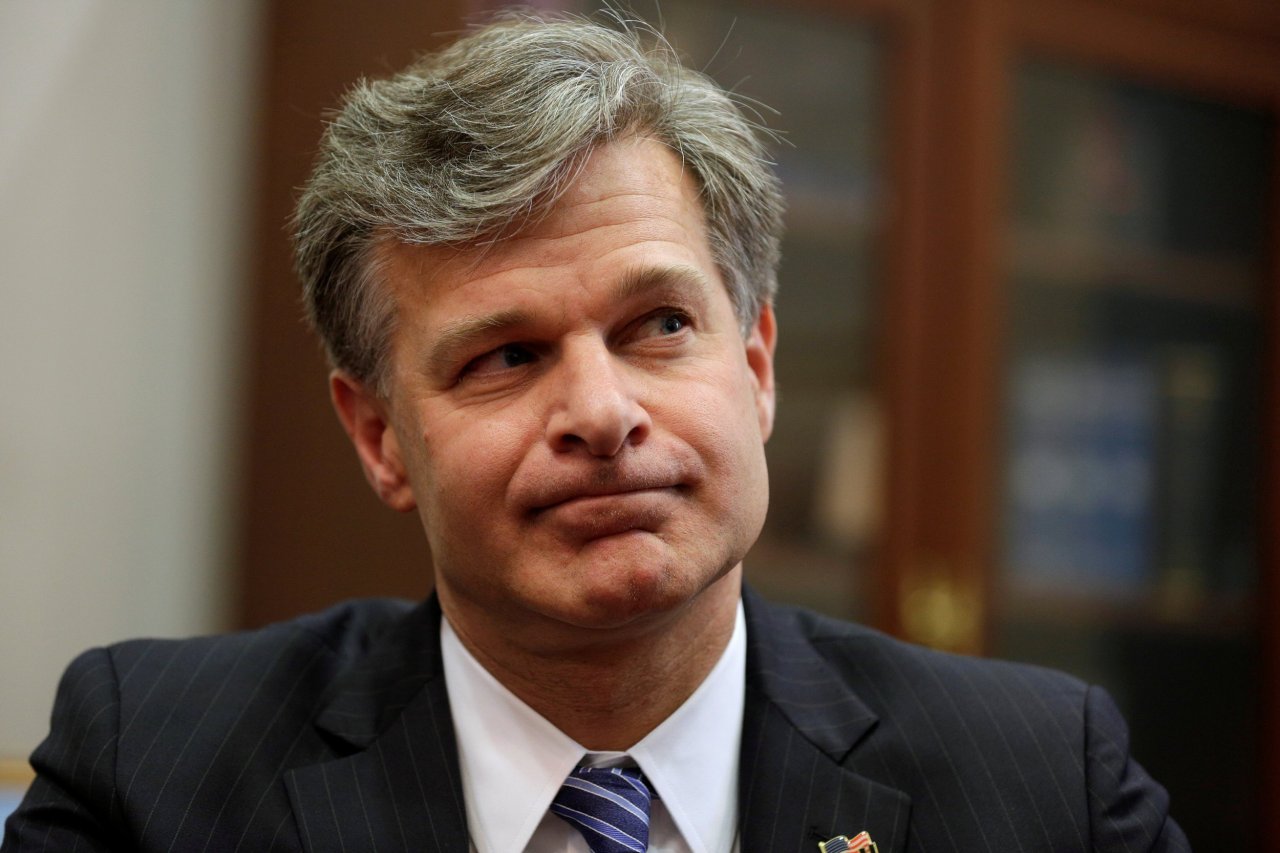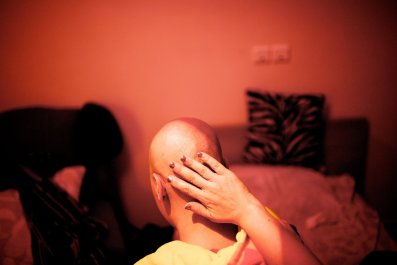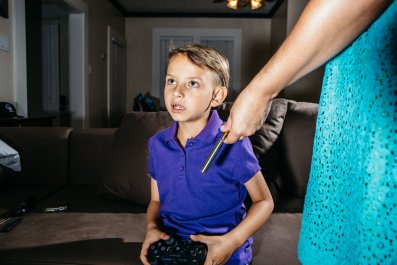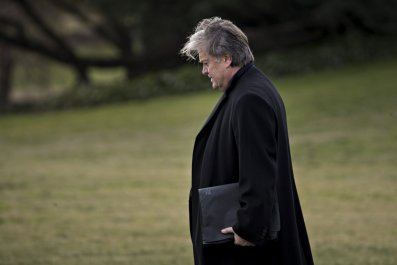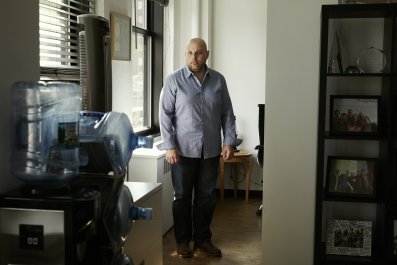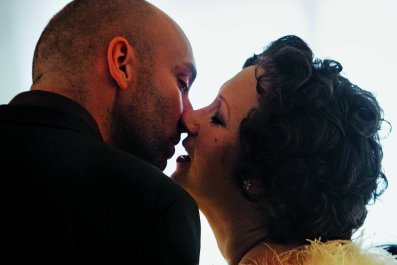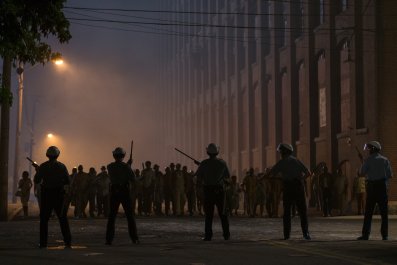Updated | In March 2004, Attorney General John Ashcroft fell ill with pancreatitis the week before he was supposed to renew a domestic surveillance program called Stellar Wind. He was taken to the intensive care unit at George Washington University Hospital, and James Comey, then his deputy, became acting attorney general. As the deadline to renew the program approached, Comey told the White House he wouldn't approve it because he was concerned it was illegal.
On March 10, the night before the renewal deadline, Comey was driving home when Ashcroft's chief of staff called and said two aides of President George W. Bush were on their way to speak with Ashcroft. Comey raced to the hospital and "ran up the stairs with my security detail," he later testified before the Senate Judiciary Committee. As Comey waited with the bedridden Ashcroft, Bush's aides entered and said they wanted approval for the program. According to Comey's testimony, Ashcroft then pointed to Comey and said, "I'm not the attorney general. There is the attorney general." The aides left.
Related: Trump will nominate Christopher Wray for FBI director
The next day, Bush reauthorized the program without Comey's signature, prompting Comey to prepare a letter of resignation—as did Robert Mueller, who was FBI director at the time. The two officials ended up convincing Bush to pursue the program in a way they believed was legal, and the incident became a career highlight for Comey and Mueller.
But there was another Justice Department official who offered to resign alongside Comey and Mueller. As those two were drafting resignation letters, Christopher Wray, then the assistant attorney general in charge of the Justice Department's criminal division, pulled Comey aside in a hallway at the agency's headquarters and told him, "Look, I don't know what's going on, but before you guys all pull the ripcords, please give me a heads‑up so I can jump with you," according to The Threat Matrix, a 2011 book about Mueller's FBI.
Comey succeeded Mueller as head of the bureau and served until President Donald Trump fired him in May. The Department of Justice then installed Mueller, who had been a lawyer in private practice, to serve as special counsel overseeing the FBI's investigation into Russian meddling in the 2016 presidential election and possible coordination with the Trump campaign.
Wray is now Trump's pick to succeed Comey as FBI director. On July 12, he appeared before the Senate Judiciary Committee for his confirmation hearing. Aside from their offers years ago to resign, Wray and Comey are very different, according to those who know them. Unlike Comey, whom Trump has called a "showboat," Wray is known as an introvert who avoids the spotlight. "Chris is a very gentle soul," says Monique Roth, who served as his senior counsel at the Justice Department. "He's not one of those grandstanders or ego-driven people. He's very self-effacing and thoughtful…. He's just a very regular guy with a big heart."
Is that the right kind of person to take on the most fraught job in Washington? If confirmed, Wray would become director at a tense time for the bureau. Trump has called the probe into possible collusion between his campaign and Russia "fake news" and "a witch hunt." Critics say it's anything but, while rank-and-file FBI agents are frustrated that their work is now perceived wrapped up in politics, not only because of the Russia investigation but also because of the FBI's probe into Hillary Clinton's use of a private email server. Then there are the usual stressors of serving as the nation's top law enforcement official, overseeing some 35,000 employees and 50,000 investigations each year, most of which do not involve the 2016 election.
Despite his sterling reputation, Wray risks getting involved in the most intractable political fight in decades. "There's an element of, Wow, what is he getting into?" says Jim Franco, a former college friend and roommate.
Or, as Roth puts it: "Would I do it [become FBI director]? Not at all. Would I recommend that anybody do it? No."
Mr. Unflappable
Christopher Asher Wray was born in New York in 1966, eight days before Christmas. His father, Cecil, who is from Nashville, Tennessee, is a retired partner at the prestigious law firm Debevoise & Plimpton and is a member of the Council on Foreign Relations, a think tank whose boards include corporate executives and world leaders. His mother, Gilda, whose family split time between Manhattan's Upper East Side and Long Island's "Gold Coast," was president of the Charles Hayden Foundation, a nonprofit focused on children's development. For high school, Wray attended Phillips Academy in Andover, Massachusetts, a boarding school that dates to 1778 and whose alumni include both Bush presidents. He studied music, philosophy and religion, and told friends he wanted to become a lawyer, like his father.
From Andover, Wray headed to Yale, along with many of his high school classmates. He brought along his electric bass guitar and would often jam with his roommates, playing mostly jazz standards. When they weren't performing their own music, Wray and his friends were listening to suitcases-full of cassettes. The young Andover graduate turned his new friends on to Pat Metheny, Yellowjackets and Jaco Pastorius. They'd also grab cheesesteaks or watch sports, with Wray rooting for the New York Mets and Giants. Rowing occupied his free time (CNN anchor Anderson Cooper was a boatmate), as did dating a former debutante from Georgia named Helen Howell, who lived above him freshman year.
"Early on, you could recognize that he had more focus and more drive than your typical college student, even your typical Yale student," says Franco, his former roommate. Jake Poinier, a friend from high school and college—and best man at his wedding—says the two would hike the Adirondacks together during summers off from school, and Wray would bring an extra windbreaker because he knew Poinier would forget one.
After getting his bachelor's degree in philosophy in 1989, Wray stayed at Yale to study law, again, like his father. (The summer in between, he married Helen, and they now have two children.) Wray later became executive editor of The Yale Law Journal, and a former classmate who wrote for it, Nora Demleitner, recalls Wray as a "person of few words, but when he spoke, people listened."
In 1992, after law school, Wray clerked for United States Court of Appeals Judge J. Michael Luttig. "He was steady. He was even, balanced, thoughtful, deliberative," recalls Luttig, now general counsel at Boeing. "There's a calm and a composure about him beginning with the moment that he hears the issue…. He's just unflappable." When Wray's clerkship ended, Griffin Bell, then a former U.S. attorney general, recruited him to work at King & Spalding, a law firm founded in the 1880s that now has more than 1,000 lawyers.
Five years later, he returned to public sector, as assistant U.S. attorney for the Northern District of Georgia. He prosecuted bank robbers, gun traffickers, a child kidnapper, a murder-for-hire hitman scheme, a serial church arsonist and a former Atlanta Braves pitcher who had committed mail fraud, among others. "I judge people when they're under pressure," says Joe Robuck, a retired FBI agent who worked with Wray on a corruption case. "I've never run into another person, whether they be a prosecutor, an FBI agent, who impressed me more."
Four months before the 9/11 attacks, Wray took a job as associate deputy U.S. attorney general in Washington, D.C. And it wasn't long before Bush nominated him to become the assistant attorney general overseeing the Justice Department's criminal division, a position once held by Mueller, the former FBI director and now special counsel. "At the age of 36, Mr. Wray has accomplished more in the legal profession than many of us, as attorneys, do in a lifetime," then-Senator Saxby Chambliss said at the confirmation hearing. The Senate approved his nomination unanimously.
As head of the criminal division, Wray was responsible for the country's 90-plus U.S. attorneys and its post-9/11 counterterrorism efforts. And he quickly became known for his work ethic, sometimes looking disheveled from pulling all-nighters. He also acquired a reputation for avoiding the spotlight and for deliberating instead of making quick calls. "He's not any kind of flamethrower," says Bill Mateja, a former Justice Department colleague. But his quiet demeanor doesn't mean he can't be forceful. "He operates as a guy who stays calm and tackles very hard," says John Richter, a friend who served as Wray's chief of staff at the criminal division and works with him at King & Spalding.
Roth, Wray's former senior counsel, adds: "He understood that what he was doing was bigger than himself and bigger than whoever got him into that job."
'Wray Doesn't Pass the Test'
Despite all the plaudits, critics wonder where Wray's loyalties lie. With the bureau? Or with the president, who appointed him to investigate his associates? (Wray did not respond to interview requests for this article.)
Part of the concern is party affiliation. The FBI nominee is a Republican, and Federal Election Commission filings show he donated to the presidential campaigns of Mitt Romney and John McCain. Since 2007, he's also given to seven Republicans running for Congress, including at least three senators who will be voting on his confirmation. Election records show he has requested Republican Party ballots for each primary since 2008. He voted last November, but the records don't indicate for whom. He is also a member of the Federalist Society, a conservative and libertarian organization whose executive vice president, Leonard Leo, is said to have advised Trump on judicial nominations. But Wray has submitted letters of support to the Senate for presidential appointees of both parties, including former Attorney General Eric Holder and former acting Attorney General Sally Yates, both Democrats.
The broader issue involves potential conflicts of interest. After returning to King & Spalding in 2005, he represented New Jersey Governor Chris Christie, a Trump ally, in the "Bridgegate" scandal. (The Christie administration was accused of closing lanes to the George Washington Bridge in 2013 as an act of political retribution.) King & Spalding also has ties to Trump and Russia. A partner at the firm, Bobby Burchfield, for instance, is the ethics adviser to Trump's business trust. And the firm also reportedly represents Rosneft and Gazprom, two Russian state-owned energy companies that are under U.S. sanctions.
Those connections concern some Democrats and civil liberties advocates. "Christopher Wray's firm's legal work for the Trump family, his history of partisan activity, as well as his history of defending Trump's transition director during a criminal scandal, makes us question his ability to lead the FBI with the independence, even-handed judgment and commitment to the rule of law that the agency deserves," Faiz Shakir, national political director of the American Civil Liberties Union, said in a statement. Senator Jeff Merkley, a Democrat from Oregon, tweeted, "Given #TrumpRussia investigation, an FBI director must be way above partisan politics and #conflictsofinterest. Unquestionably independent." He added, "Wray doesn't pass the test."
In a Senate Judiciary Committee filing prior to his FBI confirmation hearing, Wray said he had consulted the Justice Department's ethics office and was unaware of any conflicts of interest. "It is...not at all shocking to me that when the sitting governor of a state is facing an investigation by a United States attorney's office, that sitting governor might think to hire one of the most highly regarded lawyers in the country," Richter, the longtime friend and former chief of staff, says of the Governor Christie representation. He adds that Wray has had no connection to their colleague's Trump trust work, and a spokeswoman for his law firm says in a statement that if confirmed, Trump's pick "will consult closely with DOJ ethics personnel so as to avoid conflicts." The nominee has told the Senate Judiciary Committee he would withdraw from the firm upon confirmation.
Wray's biggest problem may be how he'll mesh with average FBI agents, who insiders say remain shaken from Comey's firing. "Whoever gets the job," says Frank Montoya Jr., a retired FBI official, "they're going to have a tremendous amount of work to do just to build trust" with rank-and-file agents. "This guy's going to be viewed as a Trump loyalist coming in, and he's going to have to dissuade people from this notion."
Wray seems to share this concern. Robuck, the former FBI agent who worked on a case with Wray, says the nominee called him in June "to get my opinion on how I thought he'd be accepted by the agents." Robuck says he told Wray, "I don't think that anybody in the bureau who thinks at all like I do would be anything but excited to have you as a director."
As for loyalty, Gary Bald, a retired FBI official and agent who served under five directors, and worked with Wray, says, "I don't care how good you are or what your credentials are—if you ever went into the bureau with some sort of bias, it would be detected quickly, and you would have a lot of pushback from the men and women in the FBI."
Which is why Wray—if he's confirmed—likely won't be able to shun the spotlight. Despite his introverted nature, those close to him say he'll be able to handle the pressure, just as he did when he united behind Comey and Mueller in 2004.
"The country is crying out for someone who is of the highest integrity," says Luttig, the former judge. "Someone for whom they can have great confidence to restore the position of the FBI to what it's always been."
This article has been updated to reflect the version that appears in the July 28, 2017 version of Newsweek magazine.



